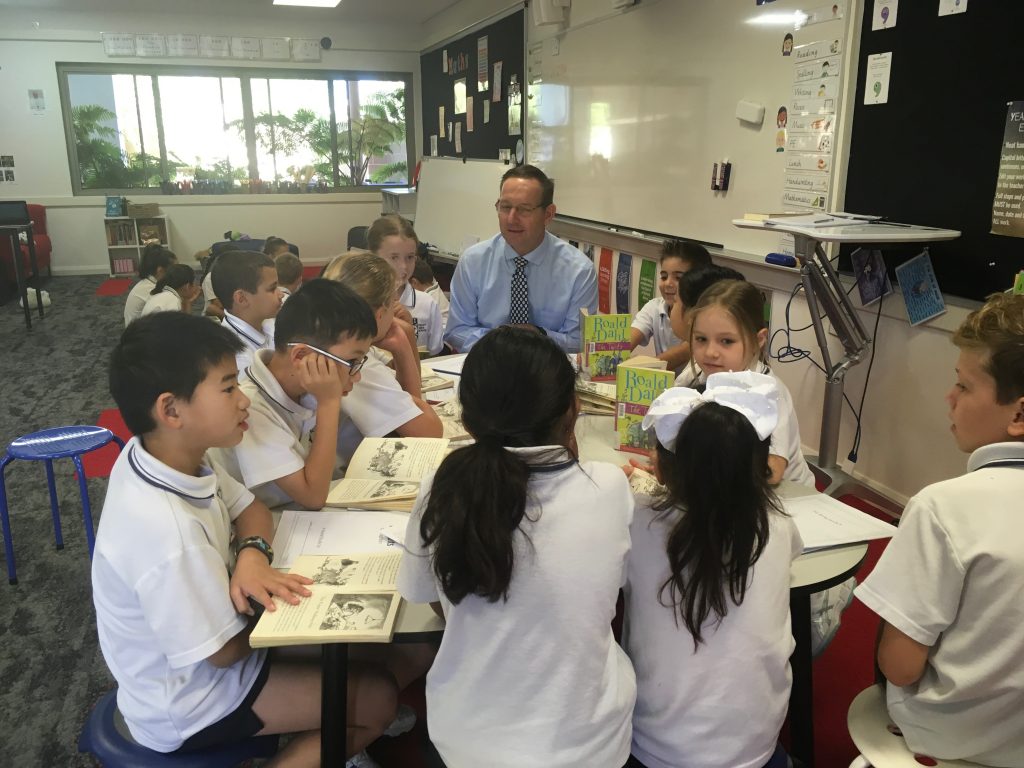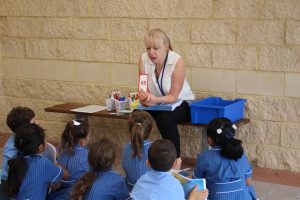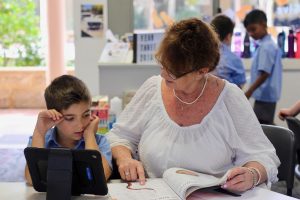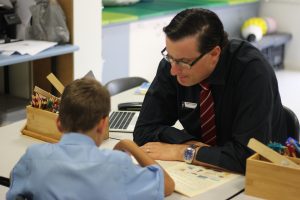

Principal’s Report – Issue 7
Dear Parents
Education Support
This week we would like to share some information about the Education Support Program that is operating at Infant Jesus School. This educational program looks at assisting and developing children with identified learning difficulties in all year levels, as well as providing extension opportunities for other children.
We are extremely fortunate, at Infant Jesus School, to be able to provide this assistance to children within the various year levels. Currently, four teachers and five Education Assistants are employed and allocated to this program. This is an enormous investment in staffing allocation to cater for and assist the needs of children within our school. The staff involved in Education Support Program at Infant Jesus School are as follows:
Teaching Staff
Ms Clare Moffat (Education Support Coordinator)
Mr Frank Colangelo
Mrs Mary Tampalini (Mathematics)
Mrs Kerry King
Education Assistants
Mrs Nicky Mabbs (Year 1)
Mrs Kerryn McLaughlin
Mrs Ornella Boorgard
Mrs Trish Wyllie (Year 2)
Mrs Sue Bonomi
Pre-Kindergarten, Kindergarten and Pre-Primary classes also have Educational Assistants aligned to them as part of the program we offer and the staffing recommendations for Early Childhood classes. These staff members were introduced to parents at the parent information evenings at the beginning of this term.
The flexibility of Education Support within the school enables us to develop areas specific to the needs of the students and the staff. Some of the key components of the program at Infant Jesus School are as follows:
As the support teacher works with each teacher they are able to assess the needs of the students, choose a specific area of focus and develop a plan to maximize the potential of all students within the chosen curriculum area. The teachers work as a team to teach the program. Students who require additional support are catered for, as are the students who require extension. An obvious benefit of this plan is that all students are extended according to their abilities within a specific learning area.
The flexibility of the role of the Education Support teacher enables students to be taught on an individual or small group basis across a range of learning areas. Generally; however, Education Support focuses on literacy and numeracy.
One of the major functions of the support program is the early identification of children with learning difficulties; this is particularly important in the junior years. Having a support teacher working with the class teacher and the children in class, or small group situations, enables this identification to take place, and individual education plans or curriculum adjustment plans established.
We use a Speech Pathologist (external) to screen all of the children in Kindergarten every year. The school receives a report and parents are informed if their child is identified with speech needs. Additionally, we have a School Psychologist (Gabriella Guagliardo) who is employed by Catholic Education Western Australia (CEWA) to work with our school. The CEWA Psychology Team areas of service include:
- Learning: e.g. intellectual disability, giftedness, Specific Learning Disorders
- Behaviour: e.g. poor self-regulation, significant attention difficulties (e.g. ADHD)
- Mental Health and Wellbeing: e.g. anxiety, depression, suicide, bullying, social skills
- School and System Support: e.g. crisis management, policy review (bullying, behaviour)
Education Support also enables teachers to further develop and enhance their skills. Teachers are constantly looking to improve their teaching skills and therefore provide all students with the optimum skills and knowledge. As teachers work as a team, they learn from each other.
The shared programming and planning is enhanced as a cooperative approach, maximizing ideas and the skills of all teachers. Teachers are able to implement the most current and up to date strategies in introducing and teaching specific skills and content.
A further priority is the allocation and collation of resources to specifically develop an area of need within the school. Students are very fortunate that a variety of resources has enabled them to develop and practice their skills. These resources include books and a wide range of software. They extend and enhance the skills already learnt, as well as enabling students to use technology to improve their skills. The area of Education Support ultimately involves all students and teachers within the school.
Family Mass
A reminder about our Family Mass this Saturday 17 March at Infant Jesus Parish commencing at 6pm. All families are encouraged to attend this first Family Mass for the school year as it provides an opportunity for families to come together in Eucharist as we give thanks and praise to God for the many blessings we have been given at Infant Jesus School. Many thanks to the families and staff who have offered to assist at the Mass either by reading the Liturgy of the Word or participating in the Offertory. All members of the School Choir will be in attendance at this Mass as they lead the singing for this celebration
This Mass will also be the Commitment Mass for our Year 6 students wishing to be Confirmed this year. It would be wonderful to see as many families as possible at this Mass.
Senior Swimming Carnival
The Senior Swimming Carnival will be held at the Bayswater Waves Swimming Complex next Friday 23 March. All students in Years 4 – 6 will be attending this school event. On this day students will need to arrive at school no later than 8.30am as the buses will be leaving the school at approximately 8.45am. All students will travel to the pool by bus for the carnival which commences at approximately 9.30am.
All parents are invited and are very welcome to attend. To ensure that the carnival runs smoothly, all students need to:
- Wear their sports uniform, including a school hat.
- Bring their morning tea, lunch and enough water for the day.
- Wear and bring some sunscreen – each bay will be provided with sunscreen.
- Ensure that all clothing, towels etc. are clearly labelled.
- Follow the rules for the day, e.g. keep their areas tidy, use passes, e.g. for the toilet.
- Be aware that this is a school event and the school expectations apply in regard to student behaviour and manners.
Students can bring mascots, to cheer with; however, these are not to be made from paper as this creates mess at the pool. Students cannot dye or colour their hair or draw on themselves with textas, pens, coloured zinc etc.
Students will not be permitted to purchase food from the kiosk throughout the day. A separate area for spectators has also been organised. Parents are asked to refrain from coming over to the faction bays. Children will be able to have lunch with their parents at the appropriate time. A Program of Events for the day will be uploaded to the newsletter next Thursday where parents can obtain a copy.
We are sure the students are looking forward to this event and we congratulate them on their efforts this term. We also acknowledge and thank the many parents who have volunteered to assist with the swimming carnival and very much appreciate their co-operation and support.
Best wishes and good luck to all the factions!
NAPLAN 2018

The National Assessment Program – Literacy and Numeracy (NAPLAN) assesses literacy and numeracy skills that are essential for every child to progress through school and life. Students in Years 3, 5, 7 and 9 participate in the annual NAPLAN tests in reading, writing, conventions of language (spelling, grammar and punctuation) and numeracy.
These assessments provide class teachers, the school, the system, the State and the country with valuable information about student ability and needs and are used in conjunction with other assessment data to inform decisions across all levels.
NAPLAN tests are just one aspect of a school’s assessment and reporting process; they do not replace ongoing assessments made by teachers about student performance.
NAPLAN tests also provide schools, education authorities and governments with information about how education programs are working and whether young Australians are meeting important educational outcomes in literacy and numeracy.
In 2018, for the first time, our school students will sit NAPLAN online. To get an idea of what the tests look like, visit the public demonstration site at nap.edu.au/online-assessment/public-demonstration-site
NAPLAN Online will not be a test of keyboard skills. There are variations in how fast and well a student can type – just as there are variations in how fast and well a student can write by hand. Year 3 students will continue to complete the writing test on paper.
It is important to remember that NAPLAN is not something that needs to be or can be ‘studied’ for. Rather it is an assessment based on content and skills taught from the Australian Curriculum. Teachers will ensure that students are comfortable with the style of assessment and alignment with the Australian Curriculum. NAPLAN is not a pass or fail type test and is designated to illustrate the range of student performance across the country. It is not expected that students will be able to answer all questions correctly.
Parents will be provided with a NAPLAN report for their child in mid-September. Individual student performance is shown on a national achievement scale for each test. The performance of individual students can be compared to the average performance of all students in Australia.
This year NAPLAN will take place from Tuesday 15 May. If you have any queries or concerns in regard to NAPLAN, please visit the official website at http://www.nap.edu.au/naplan/parent-carer-support/parent-carer-support. You can also speak with your child’s classroom teacher or Mr Frank Colangelo at the school.
Parent Teacher Meetings
Next week, parents will have the opportunity to meet with their child/ren’s teachers to discuss their progress so far this year. Parents are encouraged to play an active role in the education of their children and these interviews are an ideal forum in which to help enrich the learning opportunities for students and to build partnerships between home and school. Hopefully, parents have found the PTO online system user friendly, and have booked their appointments with their respective class teacher.
Bullying. No Way!
Friday, 16 March, marks the 2018 National Day of Action against Bullying and Violence. This annual day gives school a platform to say “Bullying. No Way!” and to reinforce the message that bullying and violence at school are not okay at school, at any time.
Parenting educator, Michael Grose, describes bullying as “an insidious behaviour that transgresses children’s natural right to feel safe and secure.” He explains that it can adversely affect children’s learning, emotional well-being, future relationships and self-esteem.
It is important to remember that bullying is not to be confused with random acts of violence, conflict, teasing or conflict. Bullying is defined as repeated verbal, physical, social or psychological behaviour that is harmful and involves the misuse of power by an individual or group towards one or more persons. The key word here is repeated. Children often tease or fight, and this should not be confused with bullying.
Listed below are a few tips offered by Michael Grose on what to do if you suspect your child is being bullied:
- Listen to their story
Children who are bullied need someone to believe their story. Take them seriously and avoid dismissing complaints as tell-tale. Use common sense to differentiate between bullying and more random, non-selective antisocial acts. Kids can be nasty to each other, yet this doesn’t constitute bullying.
- Deal with their feelings
A child who is bullied probably feels scared, angry and sad. Boys are more likely to display anger and girls claim they feel sad. The degree of emotional intensity is an indicator of the amount of bullying. Recognise and validate their emotions. Let them talk about how they think (remember boys respond better to ‘think’ language) and how it’s normal to feel sad, scared or just plain confused.
- Get the facts
Get a clear picture of what happens, including who is involved, the frequency and what happens prior to any bullying. Get your child to be as specific as possible by asking good questions. An accurate picture will help you determine your next course of action.
- Give them coping skills
With a clear picture you can start giving your child some help about how he or she may deal with bullying including using avoidance strategies, being more assertive and changing poor body language.
- Get the school involved
Bullying is best handled when parents and teachers are involved. Approach your school through the appropriate channels, make yourself aware of your schools’ anti-bullying procedures and programs.
- Help build your child’s support networks
Kids need a group of friends to support them when they experienc
e bullying so look for practical ways to broaden friendship groups.
- Build their self-confidence
Provide children with systematic encouragement. Let them know through your word
Lenten Thought
For God so loved the world that he gave his only son, so that everyone who believes in him
may not perish but may have eternal life.
(John 3: 16)

The 2018 Lenten Calendar has ideas for each of the days of Lent. Families can use this calendar to focus on preparing for Easter.
Friday Make a list of all the gifts that God has given you
Saturday Family Mass at Infant Jesus Church – 6.00pm
Feast of St Patrick. Which qualities of St Patrick can we imitate.
Monday Feast of St Joseph, husband of Mary.
Which qualities of St Joseph can we imitate?
Tuesday Give Mum and Dad a hug
Wednesday Think about one thing that you have said or done an d how it made the other person feel.
Thursday Sit with someone new at recess or lunch today
|
|
Thought for the Week
“Age is an issue of mind over matter.
If you don’t mind, it doesn’t matter.”
(Mark Twain)


Kind regards
Paul Hille
Principal
#ExpectGreatThings


© Infant Jesus School 2017
17 Smith St, Morley WA 6062
Tel: (08) 9276 1769 | Fax: (08) 9276 2998
Website by Chameleon Logic









